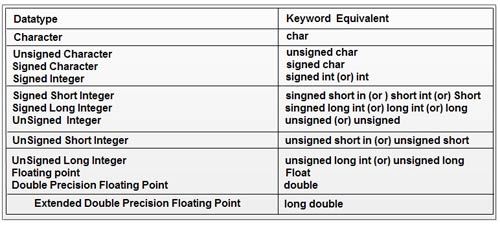A variable is an object whose value may change during execution of a program. It is a memory location used to store a data value. A variable name should be carefully chosen by the programmer so that its use is reflected in a useful way in the entire program. Variable names are case sensitive. Others are constants whose values cannot be changed during the execution of the program. However, their values have to be declared. In a program a variable may be declared as below.
General syntax for declaring a variable:
type identifier; Here type is the data type such as int, float, double, or char as listed in Table. A constant object may be declared as below.
const type identifier = value;  An object whether a variable or a constant must have a name (or identifier) with which it is identified. It is just like that we are all identified by our respective names. The type must be written in lowercase. For example, the declarations of a few integral variables are illustrated below.
An object whether a variable or a constant must have a name (or identifier) with which it is identified. It is just like that we are all identified by our respective names. The type must be written in lowercase. For example, the declarations of a few integral variables are illustrated below.
int Students; Students = 50; int Packages = 5; int Age; const int Count= 10; // Count has constant value 10.
In the above statements, int is the type of all of these variables, that is, their values can only be in whole numbers. Students, Packages, and Age are the names of the three variables, and Count is the name of a constant object with value 10. Count and Packages are initialized with the declaration, whereas in case of Students, it is first declared and then a value 50 is assigned to it. The third variable is not initialized, a value may be assigned later in a program. Similarly, the variable having values in floating decimal point may be declared and initialized as below.
floatWeight= 51.5; double PI = 3.14159;
In C language, the characters such as ‘A’, ‘B’, and ‘C’ are integer constants as per ASCII code. ASCII (pronounced as ‘as-key’) stands for American Standard Code for Information
Interchange. This code is now followed universally. In this code, every letter or symbol has an integral value. For example, the character ‘A’ is equivalent to number 65 and in computer it is stored in binary as 1000001. Similarly, ‘B’ is equivalent to 66 and is stored in binary number system as 1000010. The type of variables whose values are in single character or string of characters is char. Examples of char variables are given below.
char ch = 'B'; char Name [10]; Name= "Mona Lisa";
In the first line above, ch is the name of a variable, which is of type char, and it is initialized to value ‘B’. In the second line, Name is the name (identifier) of an array of characters. Name is first declared and then a value “MonaLisa” is assigned to it. Remember, whenever a value is assigned in terms of a character, it has to be enclosed between single quotes ( ‘ ‘ ), as illustrated in the preceding example ( ‘B’ ), and when a value is in terms of a string of characters, it has to be enclosed between double quotes (” ” ) . The number 10 in square bracket in the above declaration represents the number of characters in the string or elements of an array. In the above case, the number of characters in the name Mona Lisa including one space is 9. In case of strings of characters when value is declared in double quotes(” “),the system appends a null character ( ‘ \ 0 ‘ ) at the end of the string to mark its end. Therefore, the total number of characters becomes 10. However, the characters need not be exactly equal to the number in square bracket; it could be less as well but not more than what is declared. Note all the statements given above end with a semicolon (;).
Any variable declared in a program should confirm to the following
1. They must always begin with a letter, although some systems permit underscore as the first character.
2. The length of a variable must not be more than 8 characters.
3. White space is not allowed and
4. A variable should not be a Keyword
5. It should not contain any special characters.
Examples of Invalid Variable names are
123; (area); 6th %abc;
Declaration of Variables
Every variable used in the program should be declared to the compiler. The declaration does two things.
• Tells the compiler the variables name.
• Specifies what type of data the variable will hold.
The general format of any declaration
datatype v1, v2, v3,.... vn; Where v1, v2, v3 are variable names. Variables are separated by commas. A declaration statement must end with a semicolon.
 Dinesh Thakur holds an B.C.A, MCDBA, MCSD certifications. Dinesh authors the hugely popular
Dinesh Thakur holds an B.C.A, MCDBA, MCSD certifications. Dinesh authors the hugely popular